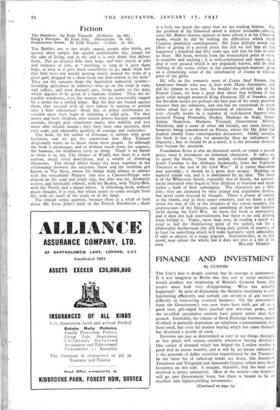Fi ction THE Battlers are, as one might expect, people who
battle, not against other people, but against undefeatable life, simply for the sake of living, and in the end it is only death that defeats them. For no disaster kills their hope, and they snatch at jobs and rumours of jobs, at " anything, as long as it gave them hope, as long as it gave them somewhere to go, made them feel that they were not merely moving slowly around the walls of a great gaol, dragged on a chain from one dole-station to the next." They are the outcasts from the Australian industrial system— including agriculture in industry—who go on the road in vans, and sulkies, and even decrepit cars, living partly on the dole, which appears to be given in a humane manner. They are in- curable wanderers, even the women who are occasionally tugged by a desire for a settled home. But the dice are loaded against them, they succeed with all their labour in earning or getting only a bare subsistence: flood, fire, or police interference in- variably ruins their hope of obtaining a solid grip. Yet they marry and have children, who almost always become uneducated nomads, though girls sometimes marry into stability and join those who inhabit houses ; they have their own morality, their own code, and admirable qualities of courage and endurance.
The book, by the author of Foveaux, is written with great freshness, and we get the impression that Miss Tennant desperately wants us to know about these people. So although the book is picaresque, and so without much form, the urgency, the humour, the kindliness carry us along. There is no theme as there is in, say, The Grapes of Wrath, but there is a stark realism, much vivid description, and a wealth of diverting characters. The thread which keeps the story together is the relationship between the saturnine Snow and the toothless girl known as The Stray, whose life brings them always in contact with the remarkable Phippsy (she was a Chester-Phipps who danced on the road and could sing, but who was fat, absolutely useless, and heroically refined), with the Busker, with Thirty-Bob, with the 'Postle, and a dozen others. A refreshing book, without much thought, it is true, but which seems to come straight from life, with no smell of the study or of the lamp.
The remark seems apposite, because there is a whiff of both about Mr. Evan John's story of the French Revolution ; there is a little too much the sense that we are reading history. But the problem of the historical novel is almost insoluble—almost, since Mr. Robert Graves appears to have solved it in his Claudius books, which he did by making the difficulties which faced Claudius absolutely contemporary. Mr. John skilfully avoids the effect of giving us a period piece, but still we feel that all this happened a hundred and fifty years ago, and that he fails to take us there. His book, written from the monarchical point of view, is readable and exciting ; it is well-constructed and opens up a deal of new ground which is not popularly known, and its able shifting of the scene, rather in the cinematograph-manner, gives us a stimulating sense of the simultaneity of events in various parts of the globe.
He tells us the romantic story of Count Axel Fersen, the handsome Swede who was in love with Marie Antoinette, and did his utmost to save her. So besides the .oft-told tale of the French Court, we hear a great deal about that brilliant if not quite solid enough monarch King Gustavus III of Sweden, and the Swedish scenes are perhaps the best part of the story, possibly because they are unknown, and one has no temptation to argue either about fact or the interpretation of character. Mr. John very cleverly works in a number of well-known figures—the decayed Young Pretender, Necker, Madame de Stae.1, Saint- Simon, Napoleon, Madame Tsssaud, Gouverneur Morris, Mirabeau, and a score of other old friends, our main interest, however, being concentrated on Fersen, whose life Mr. John has studied closely from contemporary documents. Oddly enough, his book is less a plea for monarchy than an indictment of oligarchy ; but, as should be in a novel, it is the personal element that focuses the attention.
Foundation Stone is also an historical novel, or rather a period piece, since it introduces no historical characters. It takes us, to quote the blurb, " from the settled, civilised splendours of South Carolina to the Alabama backwoods, from the Eighteen Twenties to the end of the Civil War." It is rather flocculent and unwieldy ; it should be a great deal crisper. Nothing in especial stands out, and it is dominated by no idea. The story is of the Whetstone family, especially that of Gerda, the authori- tarian matriarch who began to bear children at fourteen and made rather a hash of their upbringing. The characters are a little dim ; they are animated by their animal and acquisitive desires, but never seem directed by thought. There is plenty of variety in the family, and in their negro retainers, and we learn a deal about the way of life of the invaders of the cotton country, the dispossessors of the Indians, and something of how the families fared during the Civil War. In short, the book is instructive, and it does not lack entertainment, but there is no real driving force behind it. Today, more than ever, in reading a novel we need to feel the illuminating spirit of the author, ask for a philosophic background (the pill being duly gilded, of course), or at least for something which will make humanity seem admirable, if only as players in a tragic pageant. Sentimentality, as in this novel, may colour the whole, but it does not give it a life of its






























 Previous page
Previous page